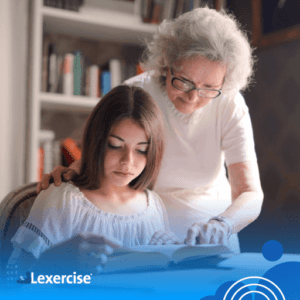A Better Way to Profile Reading Skills
Written by Sandie Barrie Blackley, Speech-Language Pathologist
Published on October 3, 2022
 In our previous post, we discussed the problems with using “grade level” as a measure of reading proficiency. See What Does Reading on Grade Level Mean?
In our previous post, we discussed the problems with using “grade level” as a measure of reading proficiency. See What Does Reading on Grade Level Mean?
The current grade-level approach incorrectly implies that language comprehension and topic knowledge can be separated and that reading skills can be measured independently of knowledge of the topic. But, if grade level is not a very meaningful or precise way to profile reading abilities, what might be better?
A More Meaningful Way to Profile Reading Skills
The science of reading suggests a key to a more meaningful way to profile reading skills. The Simple View of Reading tells us that comprehending reading material requires two main abilities:
- The ability to understand the spoken language of the material, including the topic, the meaning of the words, and the sentences.
- The ability to read (decode) the written words.
The 1st of these abilities depends a great deal on the reader’s knowledge about the topic. Topical knowledge requires education or at least experience.
The 2nd of these abilities depends on the reader’s ability to identify (decode) the written words.
Consider this fill-in-the-blank question that might appear on a 3rd-grade science test:

If the student has never been exposed to a science curriculum focused on the properties of matter, they may struggle to choose the correct answer (gas), even if they understand the words and the question and choices were read aloud to them. This is a knowledge gap.
Some students, even those who have been exposed to a curriculum about the properties of matter and understand these properties may struggle to answer the question due to difficulty reading the words. This is a word reading gap.
Recent research suggests that assessment using the Simple View of Reading has the potential to determine a student’s reading profile and to identify the appropriate intervention methods for students who struggle (Sleeman, et al., 2022). Because comprehension is so tightly related to topic and vocabulary knowledge, it makes sense to assess reading skills using materials on topics the student has covered.
Content area teachers (e.g., in science or social studies) don’t typically think of their assessments as tests of reading. But often reading is at the heart of struggling students’ difficulties in mastering content area subjects. If teachers had a way to measure their students’ verbal responses as follows, it would help them pinpoint any reading difficulties:
- Can the student answer questions orally about the material?
- Can the student read (pronounce from print) isolated content words from the material?
The role of knowledge in reading comprehension is a super-hot topic in today’s science-of-reading discussions. See Closing the Gap. But, despite the “simple” and rational guidance provided by the Simple View of Reading, methods for assessing reading skills that don’t depend on overly simplistic averages and grade level equivalents have been elusive.
What do you think? If you were creating a testing system, how would you balance subject knowledge and word reading? We’d love to hear from you. Please leave a comment!
How Lexercise Can Help with Reading Performance
If your child is a struggling reader, Lexercise can help. Lexercise identifies and treats dyslexia and other learning difficulties with online reading, writing, and spelling therapy. Children who complete the Lexercise program improve 3 grade levels on average! Learn more on the Lexercise website, or contact us today.
References
Sleeman, M., Everatt, J., Arrow, A., and Denston, A. (2022). The identification and classification of struggling readers based on the simple view of reading, Dyslexia 28(3).
DOI: 10.1002/dys.1719 LicenseCC BY-NC-ND 4.0
Wexler, N. (2019). The Knowledge Gap: The hidden cause of America’s broken education system–and how to fix it. Avery, an imprint of Penguin Random House LLC.
Wexler, N. (2022). Why 3 Popular Infographics on Reading Don’t Tell the Whole Story. Minding the Gap. July 17, 2022.
Improve Your Child’s Reading
Learn more about Lexercise today.
Schedule a FREE
15-minute consultation


